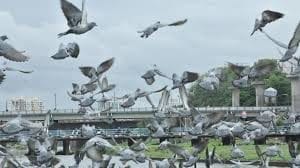WIMBLEDON, England, July 6 It’s clear skies Thanks to Wayne Davis and his fine-feathered friends, raindrops are the only thing that Wimbledon fans have to worry about dropping from the sky and into their bowls of strawberries and cream.
The All England Club would seem a wonderful place to be a pigeon. There are nooks, crannies and overhangs. There are trees and grass. And, for two weeks out of the year, there is litter and food and people to hassle, which seems to be what pigeons do best.
But there are no pigeons here, save the occasional wayward straggler who, apparently, has only recently arrived from out of town.
Davis stood on the grass-covered terrace atop the Broadcast Center, several stories high, about even with the top of Center Court. From there you could see the tennis courts below, the leafy suburbs that surround them, and downtown London in the distance.
And, above, was one of his Peregrine falcons, circling the sky, issuing a silent warning that being a pigeon and being here is not a good idea.
Davis swung a rope like a lasso. At its end was a meaty piece of quail attached to a leather lure. The falcon, this one named Callisto, dived toward the food and swooped past, like a bull to a matador. After a few passes, Davis dropped the decoy to his feet, and the brown falcon with a speckled chest came down to earth and feasted.
“I’ve been doing this 25 years,” said Davis, smiling at the spectacle of the bird’s flight. “I still think that was brilliant. I enjoyed that.”
Wimbledon began its championship in 1877, and for most of the years since, pigeons have been among those who flocked to watch and socialize. They would eat the grass seed in the spring and nest under the Center Court roof. Every year, workers would try to remove the nests before the tournament. Still, the pigeons would flutter about the courts, and, well, bomb the fans with unpleasant surprises.
“In the old, old days, they probably used to shoot them,” the Wimbledon spokesman Johnny Perkins said of the pigeons in London and at the tennis club. “But in these touchy feely times, they probably decided that wasn’t the best option. This seems to be the best compromise, really.”
Helping Wimbledon limit its spectators to ticket-holding humans was the idea of Davis’s wife. She was watching the tournament on television a few years ago, and saw players shooing pigeons with rackets. So Davis called the All England Club and offered a demonstration of his services. The club liked what it saw, and Davis was hired beginning in 1999.
Davis owns a company called Avian Control Systems. With his small flock of hawks, falcons and owls, he shoos other birds using little more than fright tactics. Lesser birds see his birds soaring around, and they find somewhere else to go.
“Falconer,” Davis said, chewing on a suggestion for his job title. “I like that. I get called bird man, but falconer is nice, isn’t it?”
Davis does much of his work at airports and military airfields, where geese, gulls and other unsuspecting birds can pose safety risks if they find their way into jet engines.
Other clients see birds as a nuisance, not a danger. Davis has contracts with Westminster Abbey and Canary Wharf, a glass-and-steel business district along the Thames. Like the All England Club, they wanted a non-messy way to get rid of the mess-making birds, particularly the feral pigeon, the familiar gray ones common to so many cities.
“In the middle of the city, there are hundreds of thousands of pigeons all around,” Davis said. “All we can do is make it less comfortable for them.”
Pigeons, it seems, have memories that last at least a couple of days. At Wimbledon, Davis and his birds come a few times a week, throughout the year. That is enough to keep them from roosting in the rafters of the show courts “They’re like surrogate cliffs, really,” Davis said and from eating the grass seed when it is planted in the spring across nearly 40 courts.
“It’s analogous to cleaning,” he said. “You solve the problem with an intensive period, and keep it up with maintenance.” 
At his country house in Northamptonshire, well north of London, Davis and his birds load into a van before dawn, so that they can do their work before the tennis crowds arrive.
On the roof, with its postcard view, Davis sent the falcon flying. A small bell was attached to its tail, and a radio transmitter to its ankle. It circled and swooped, then lifted like a rocket toward the gray clouds. There was not a pigeon in sight.
And down below, workers were preparing Wimbledon for another day. Somewhere, strawberries were being readied, and vats of cream sat in a cooler. Wimbledon cannot do much about the rain, but it is not fully ceding the skies.
Source from NY Times
At Pigeon Patrol, we manufacture and offer a variety of bird deterrents, ranging from Ultra-flex Bird Spikes with UV protection, Bird Netting, 4-S Gel and the best Ultrasonic and audible sound devices on the market today.
Contact us at 1- 877– 4– NO-BIRD, (604) 585-9279 or visit our website at www.pigeonpatrol.ca
Bird Gone, Pigeon Gone, Seagull Gone, Pigeon issue, pigeon spikes, 1-877-4NO-BIRD, 4-S Gel, Bird Control, Pigeon Control, bird repellent, Bird Spikes, sonic bird repellent, stainless steel bird spikes, bird spikes Vancouver, Ultra Sonic Bird Control, Bird Netting, Plastic Bird Spikes, Canada bird spike deterrents, Pigeon Pests, B Gone Pigeon, Pigeon Patrol, pest controller, pest control operator, pest control technician, Pigeon Control Products, humane pigeon spikes, pigeon deterrents, pigeon traps, Pigeon repellents, Sound & Laser Deterrents, wildlife control, raccoon, skunk, squirrel deterrent, De-Fence Spikes, Dragons Den, Canada bird spikes, Canada pigeon, pigeon control, pigeon patrol, pigeon. Kill pigeons, crow, starling
